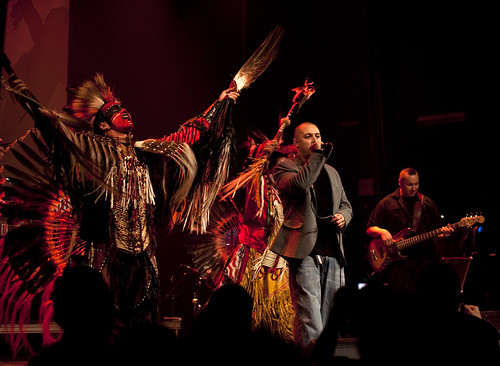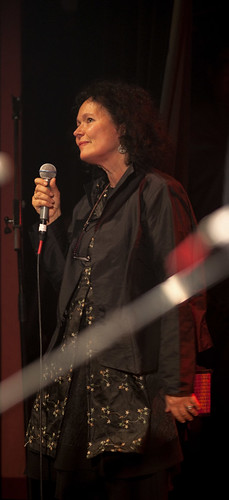A few days ago I went to a terrific benefit concert for Wapikoni mobile at Club Soda in downtown Montreal. Some great artists, including Anishnabe rapper Samian, Inuit singer-songwriter Elisapie Isaac, singer-songwriter Richard Séguin and the immensely popular group Loco Locass put on a great show. (Photo by Guy Labissionnaire.)
I find Samian’s lyrics and performance extremely powerful. Normally one would say that art benefits from being subtle, exploring nuances and transposing its vision to something loftier than straight discourse. But Samian just calls a spade a spade, denouncing the conditions in aboriginal communities and government hypocrisy with total directness and a great deal of panache. And it works, artistically as well as editorially.
I have written about Wapikoni mobile before: it’s a really important project, praiseworthy even, a mobile video and music production studio for young aboriginal people. It has been in operation since 2004, allowing youth on reserves in Quebec to produce hundreds of short videos, many of them shown in festivals here and abroad. It’s an essential means of self-expression for young people who often face despair.
But Wapikoni mobile was hit hard by cutbacks by the federal Human Resources Department, losing $490,000, or half its funding, last year. Because of this, it was only able to take its mobile studios to seven communities rather than the regular fifteen last year. This was a huge disappointment to aboriginal youths who had been counting on its presence. As we all know, positive and inspiring experiences are badly needed in First Nations communities in Canada, and these federal cutbacks are incomprehensible. Perhaps paying for less portraits of the Queen, or cancelling the order for just one fighter jet would have allowed this valuable program to go on as before.
The founder of Wapikoni mobile, Manon Barbeau, was celebrated last night, as she vowed to carry on the fight. She told me the project still has funding from Health Canada, Quebec’s Secretariat of Aboriginal Affairs, and some band councils such as that of Chisasibi, a Cree community much affected by hydro development. Manon told me Wapikoni mobile is far from dead, and has many plans, including musical training by professional musicians.
“It’s just too bad that the cutbacks have hit the real heart of the project, the month-long workshops in fifteen communities. This event will help us recover some precious ground.”
Thanks to Tobi Elliott for her help with the blog.

